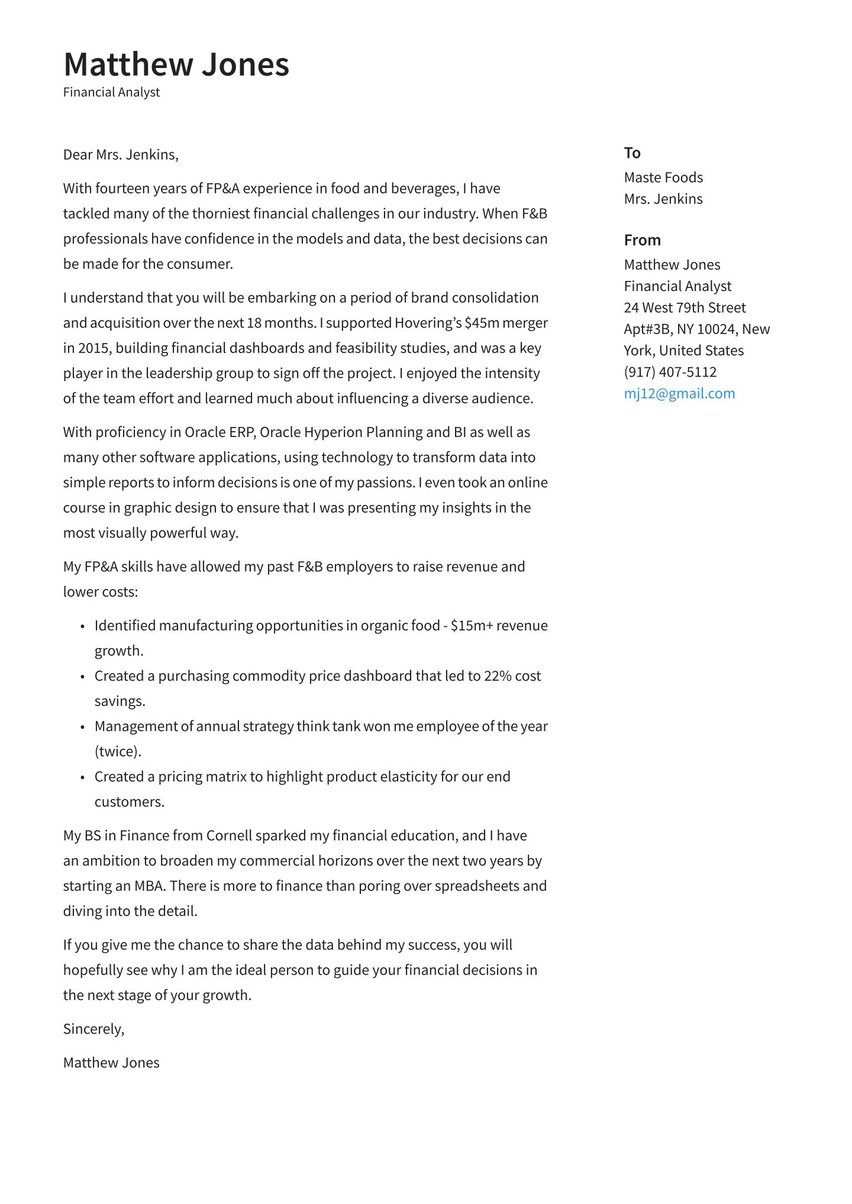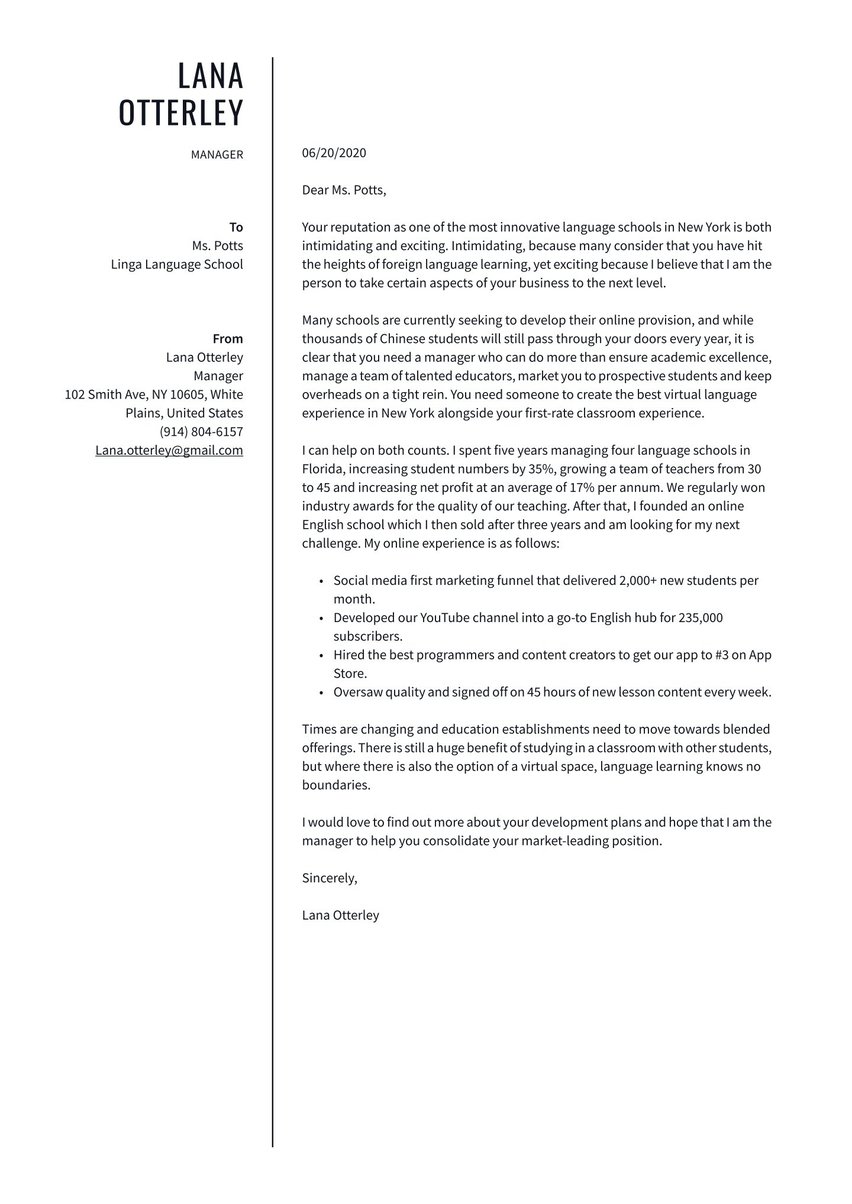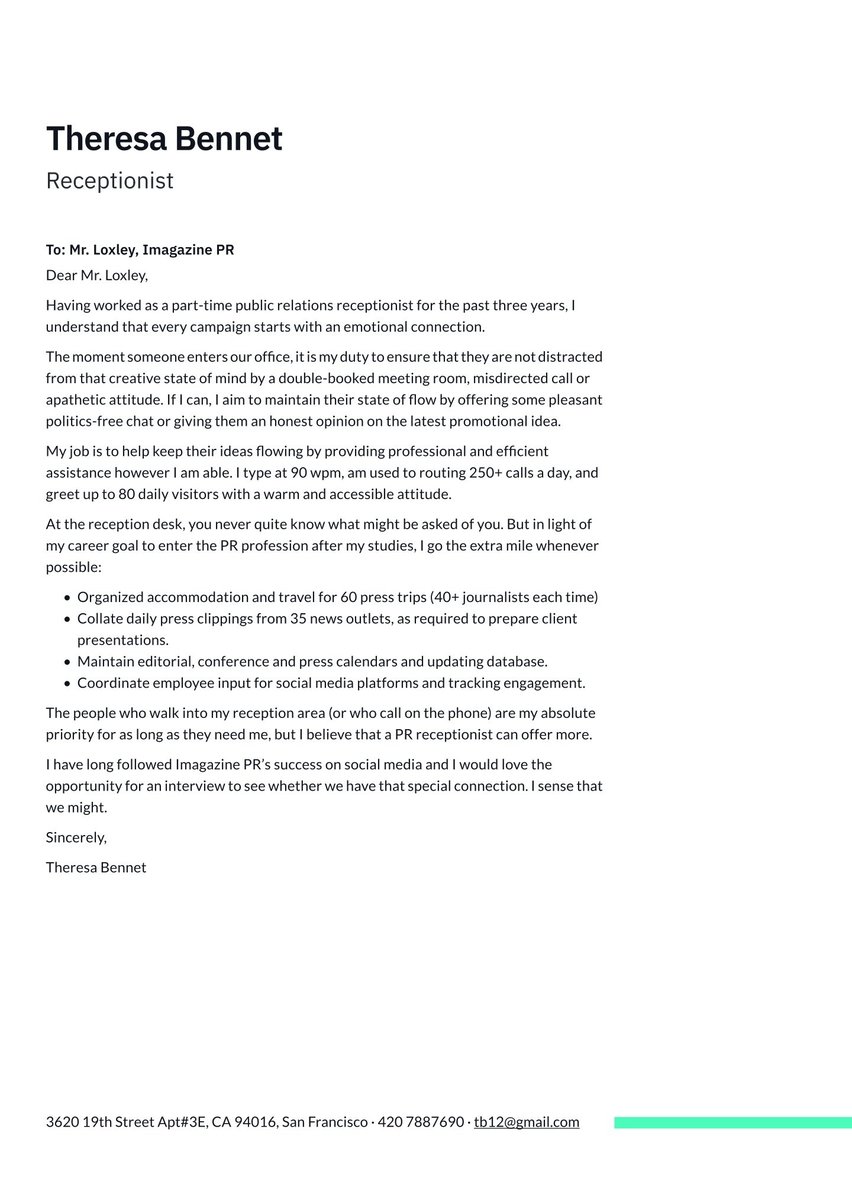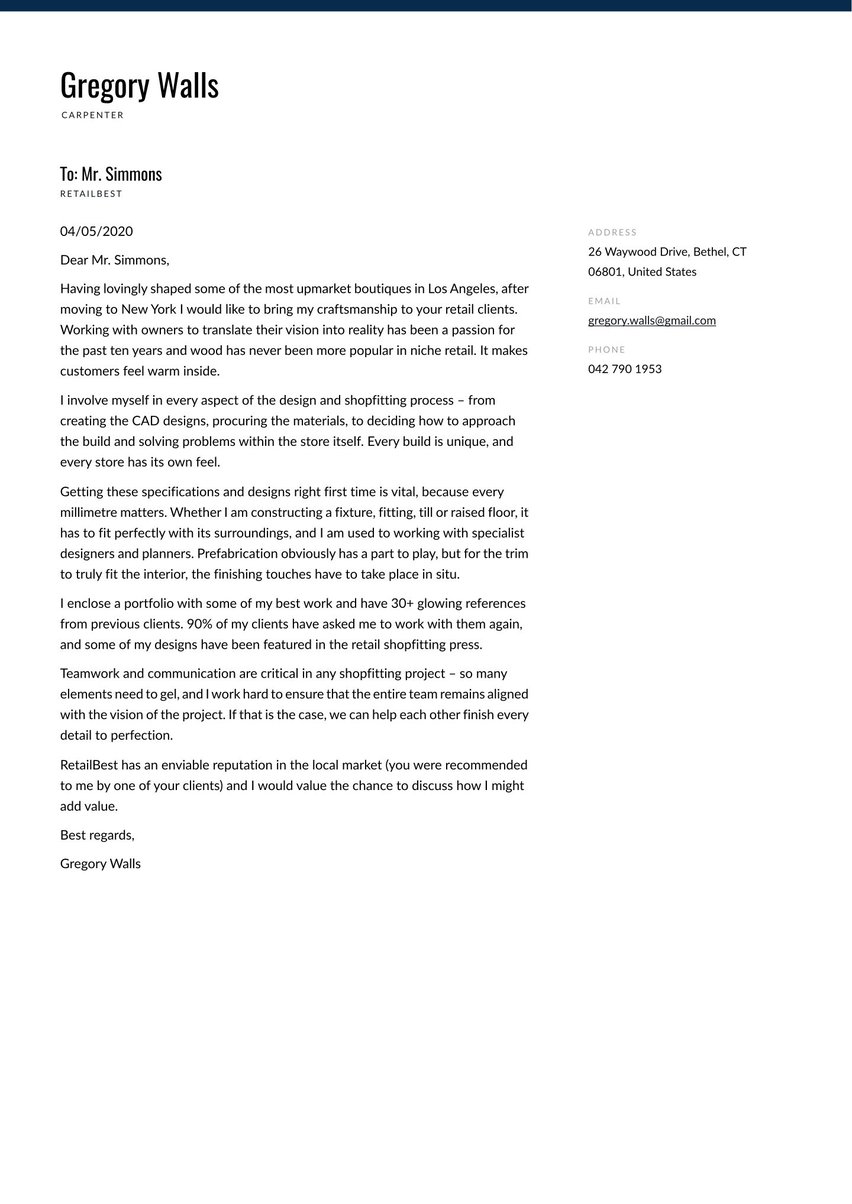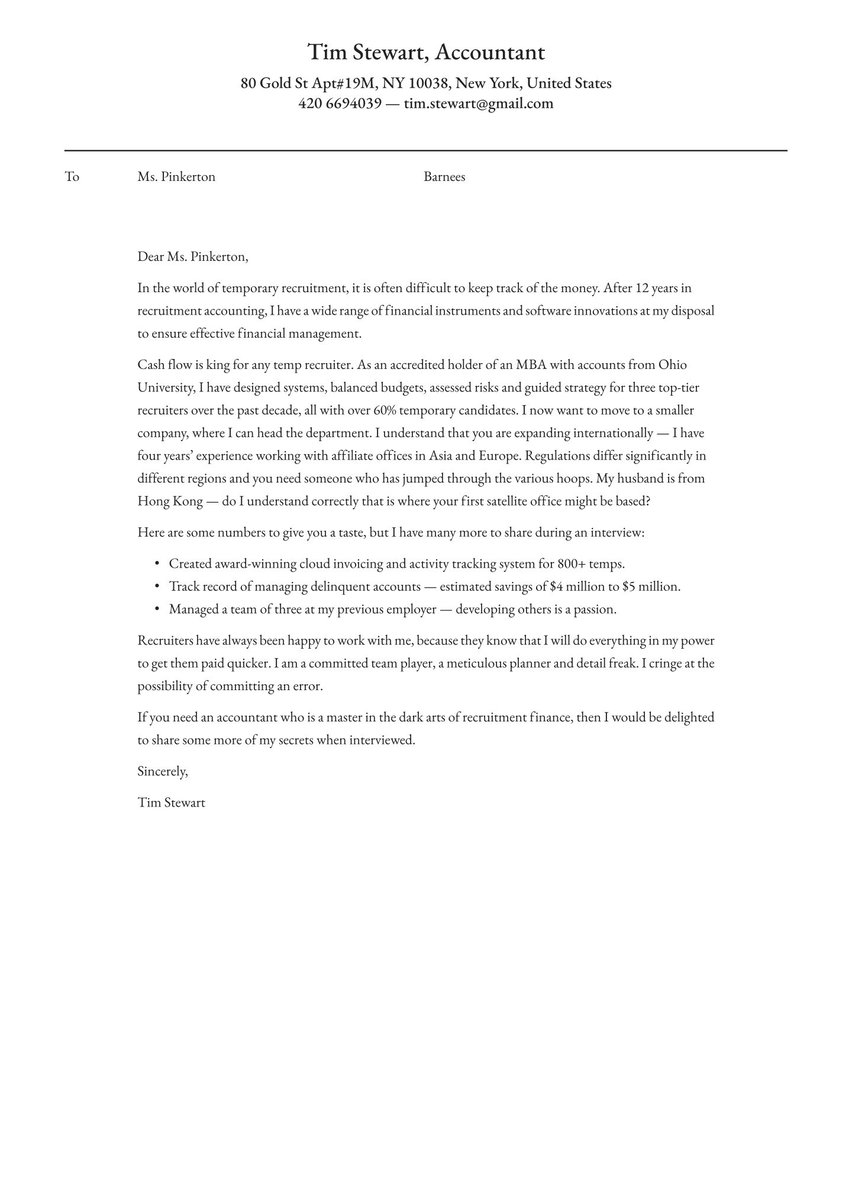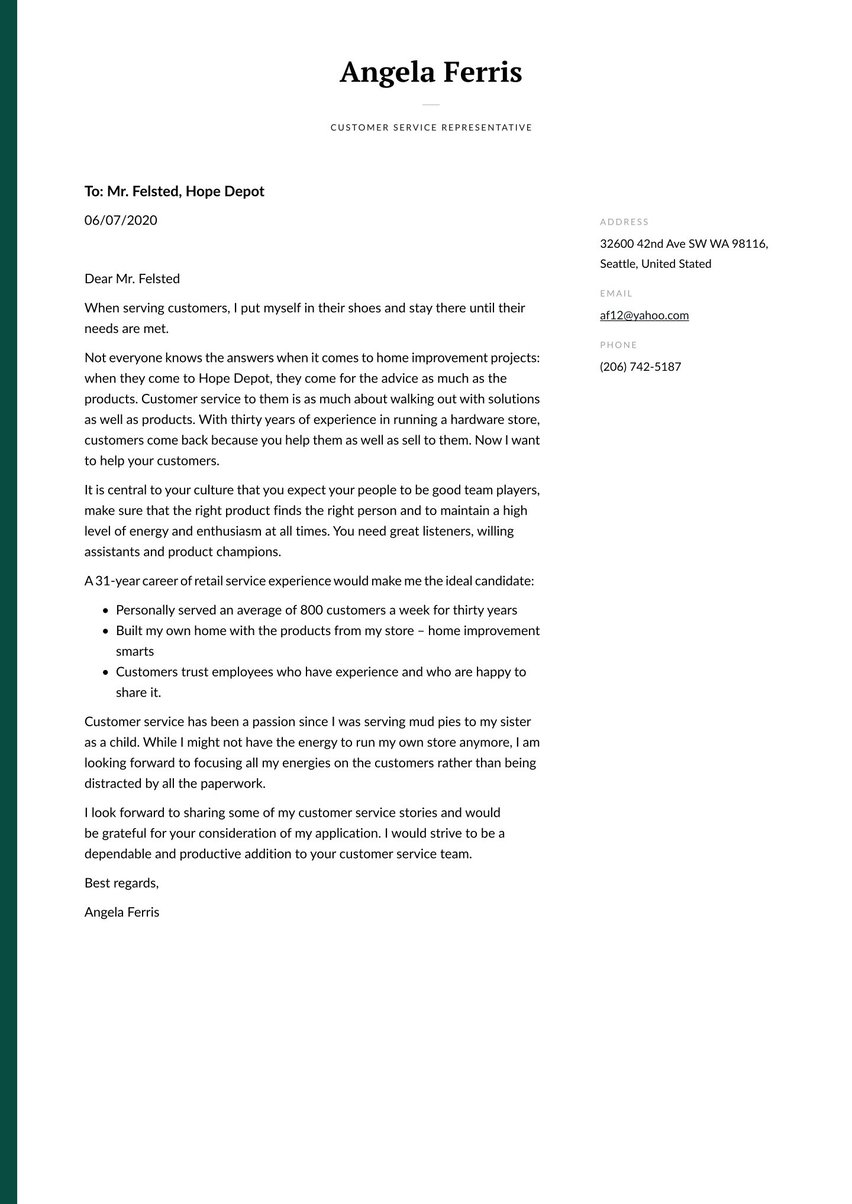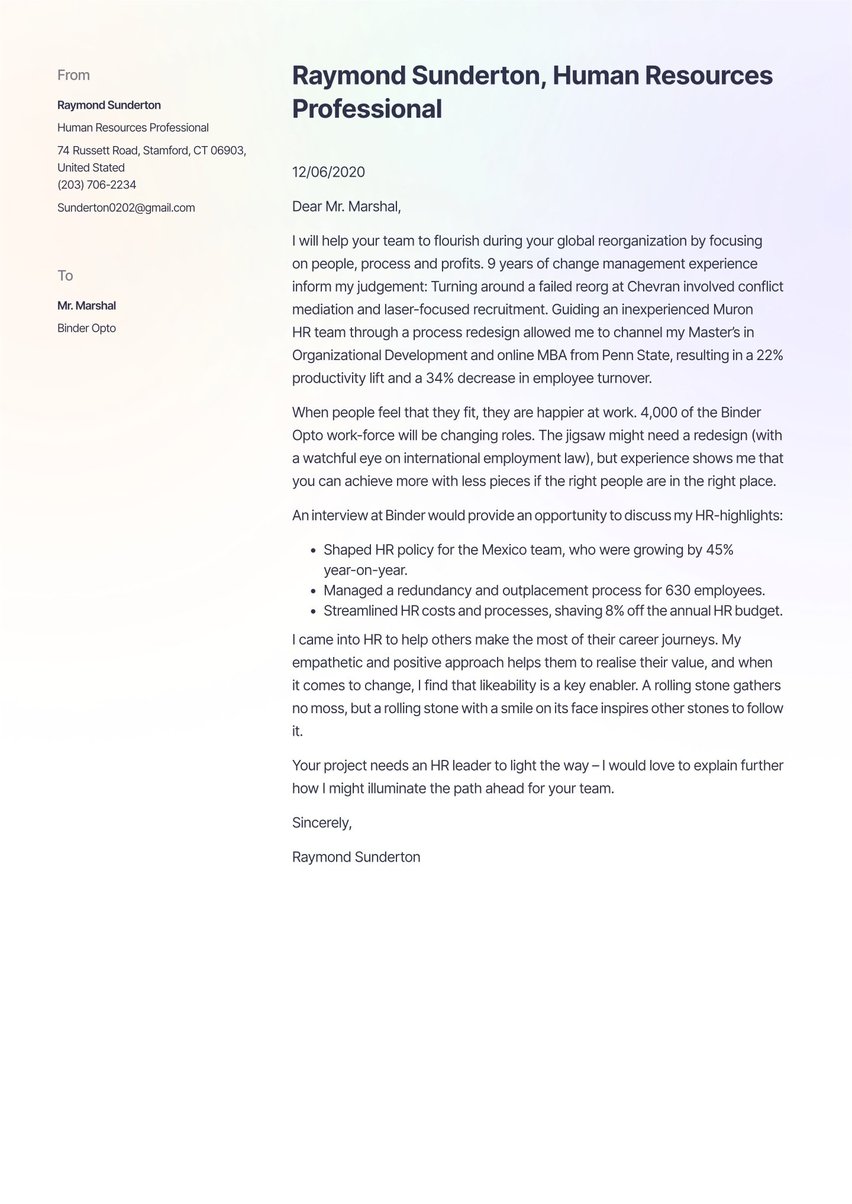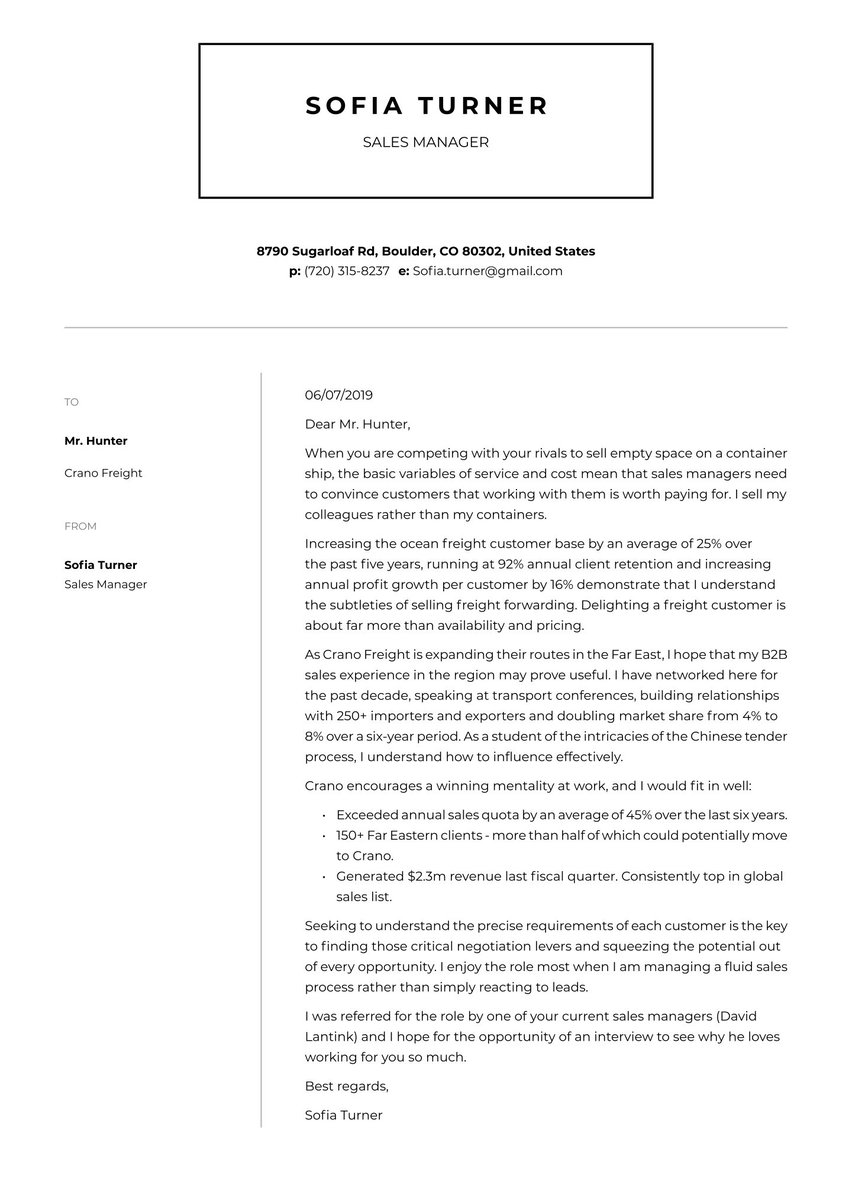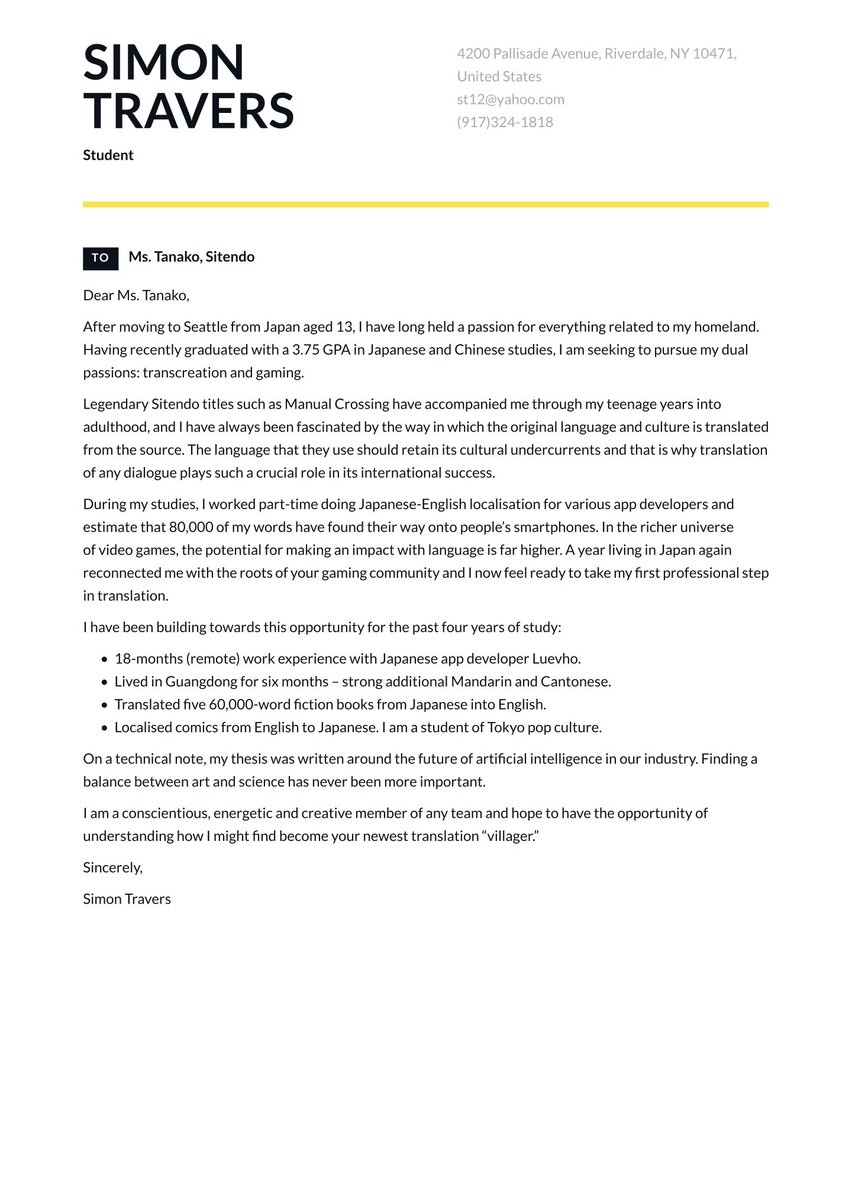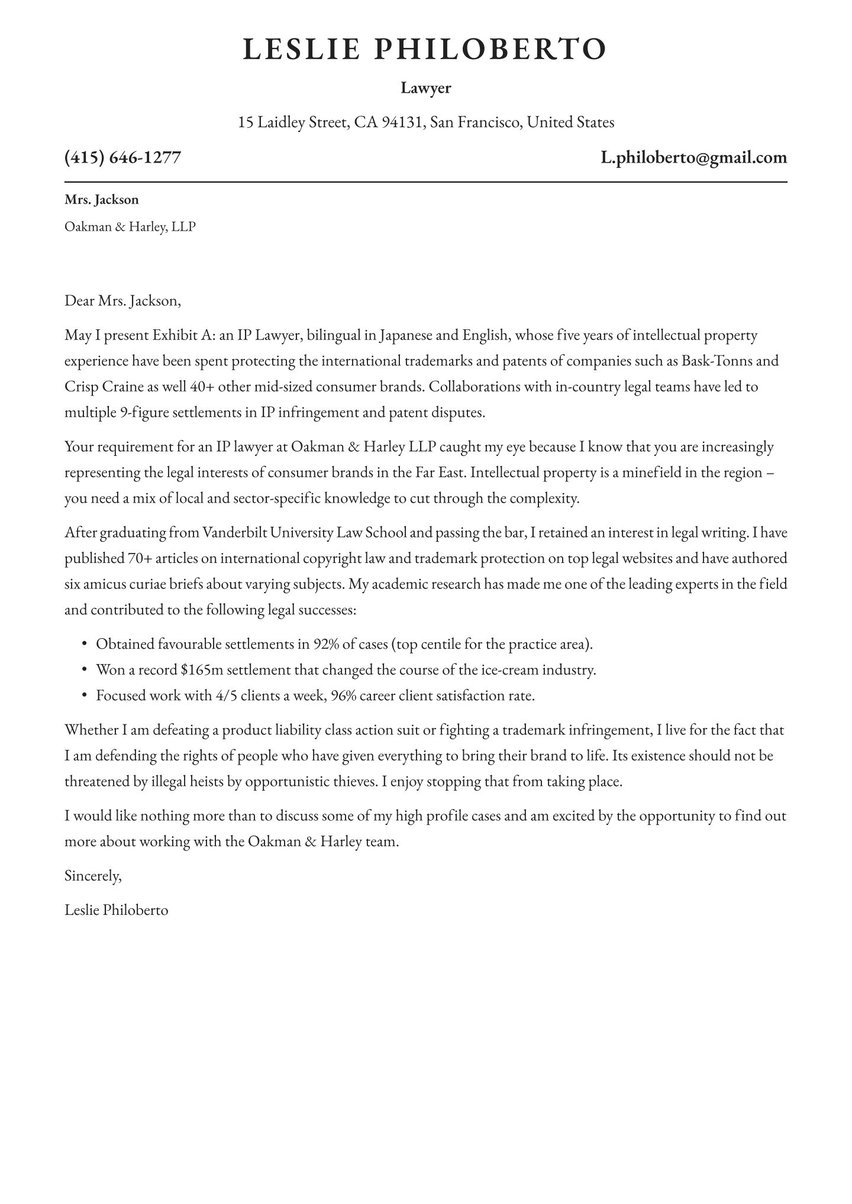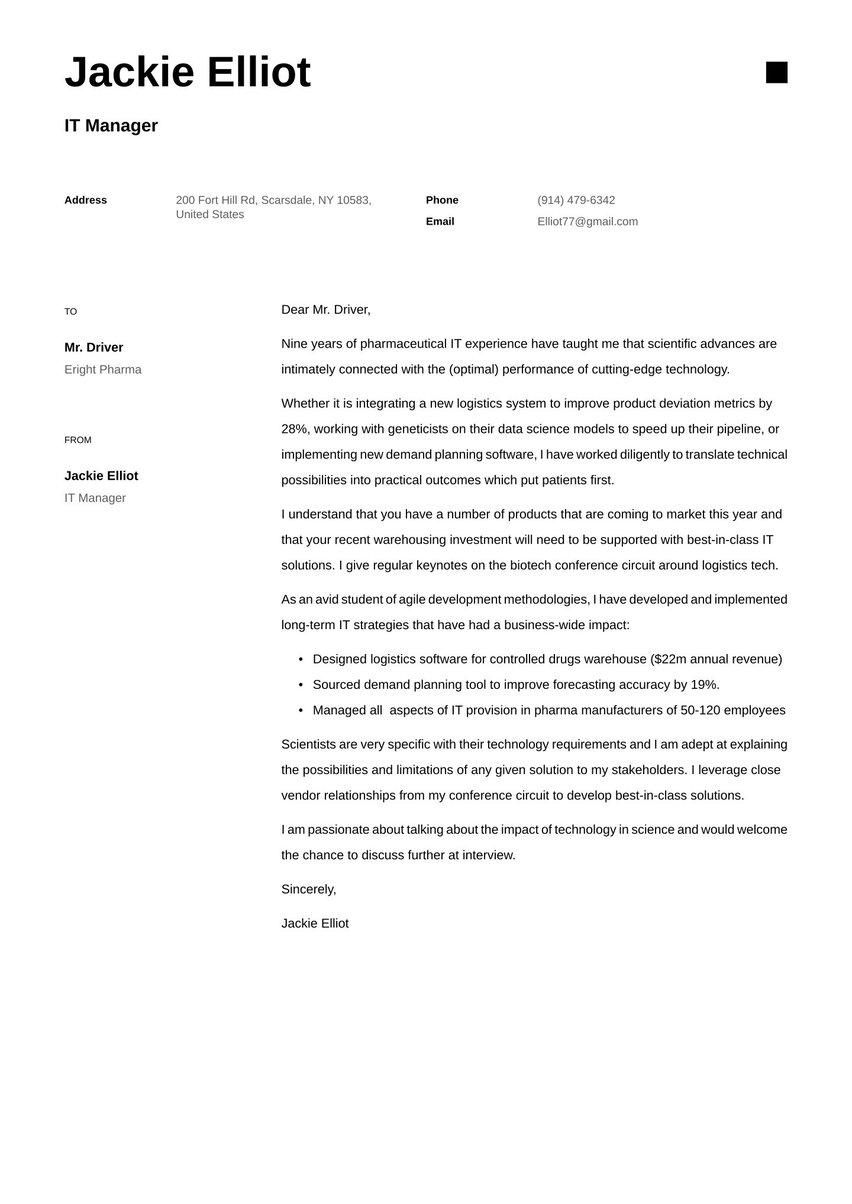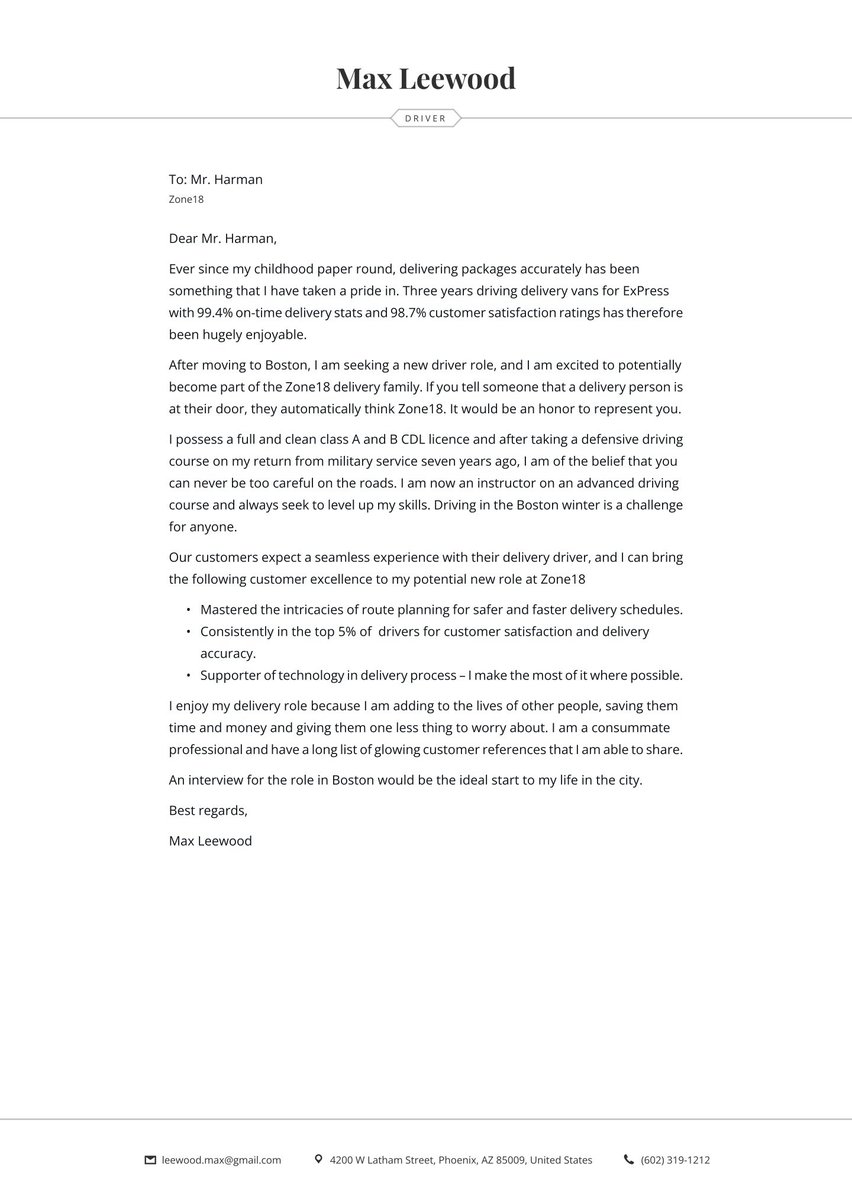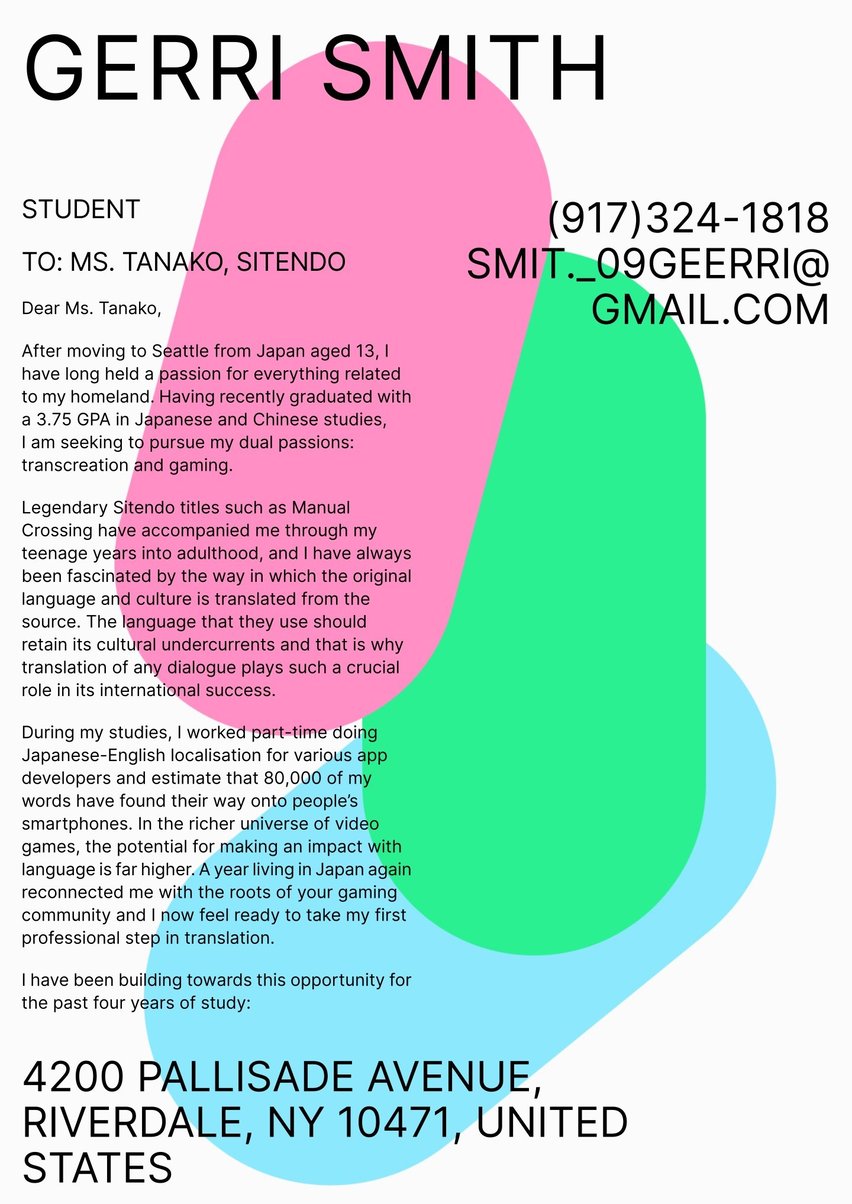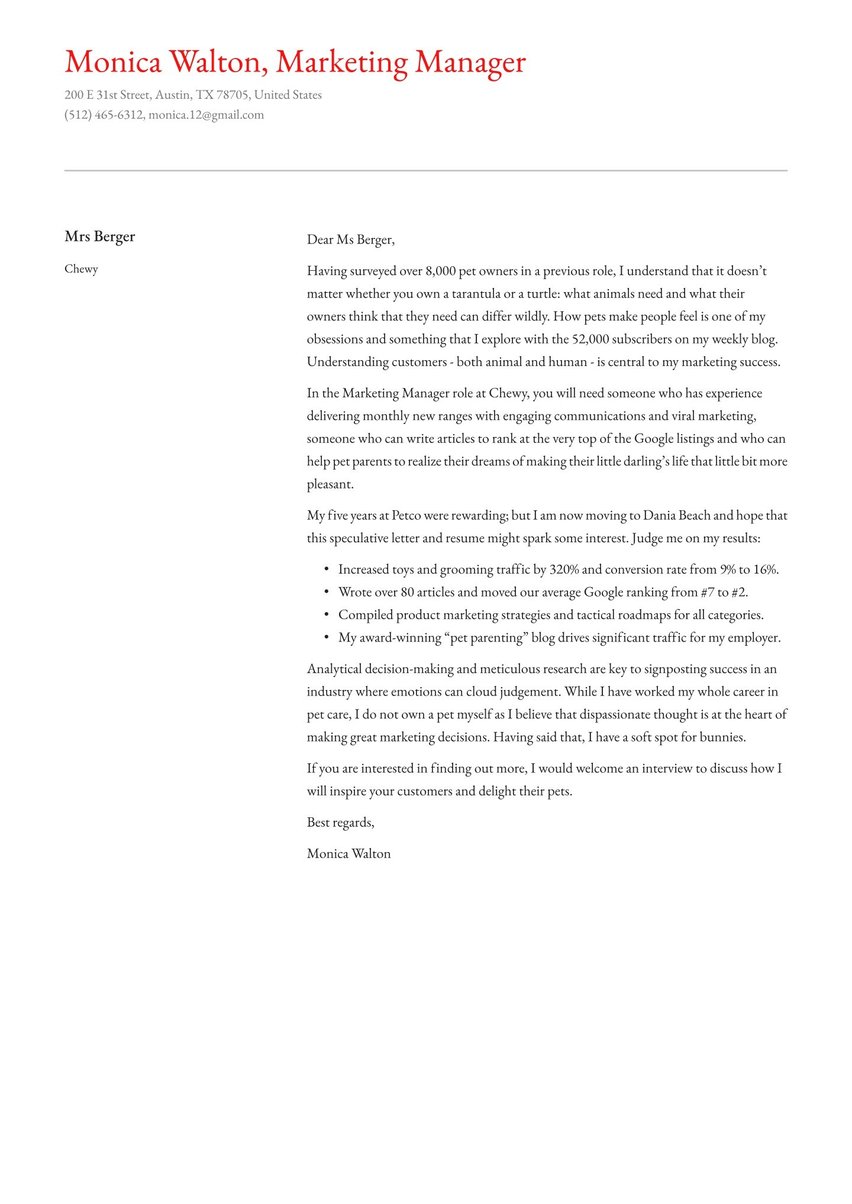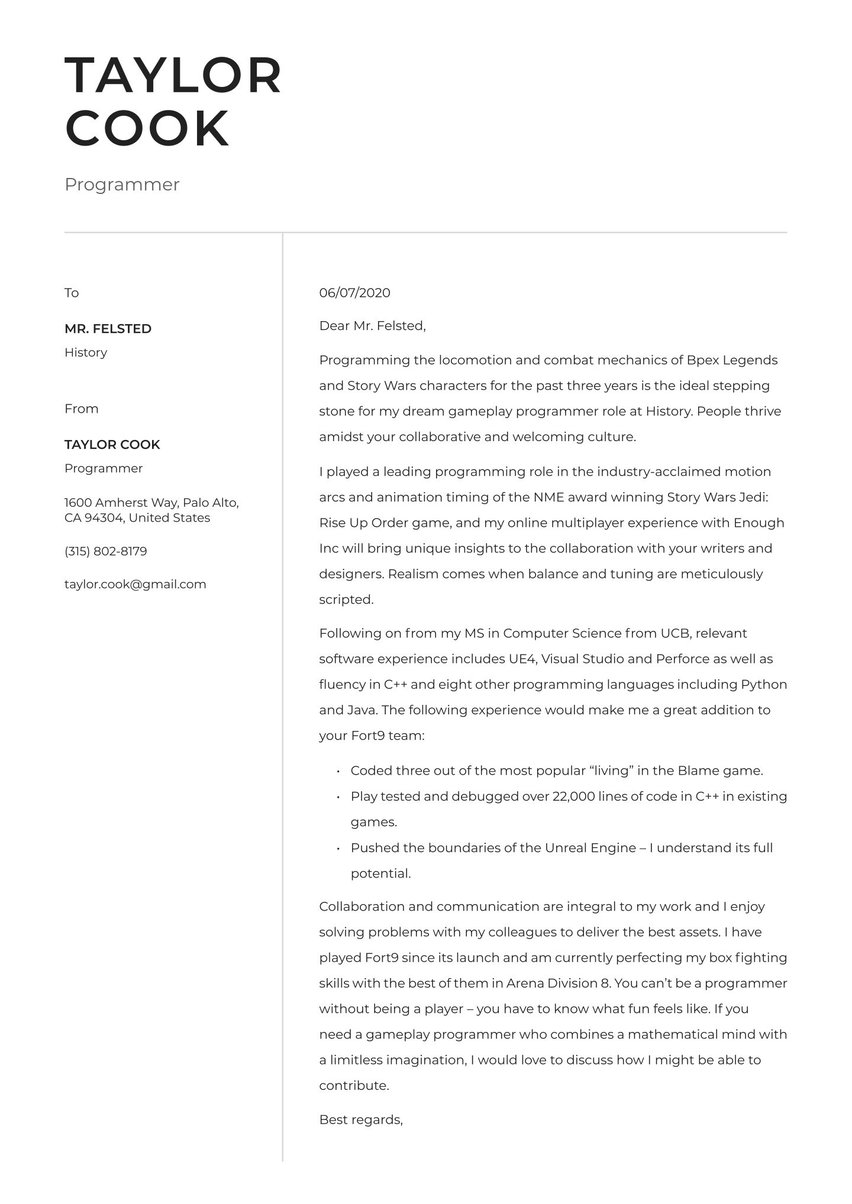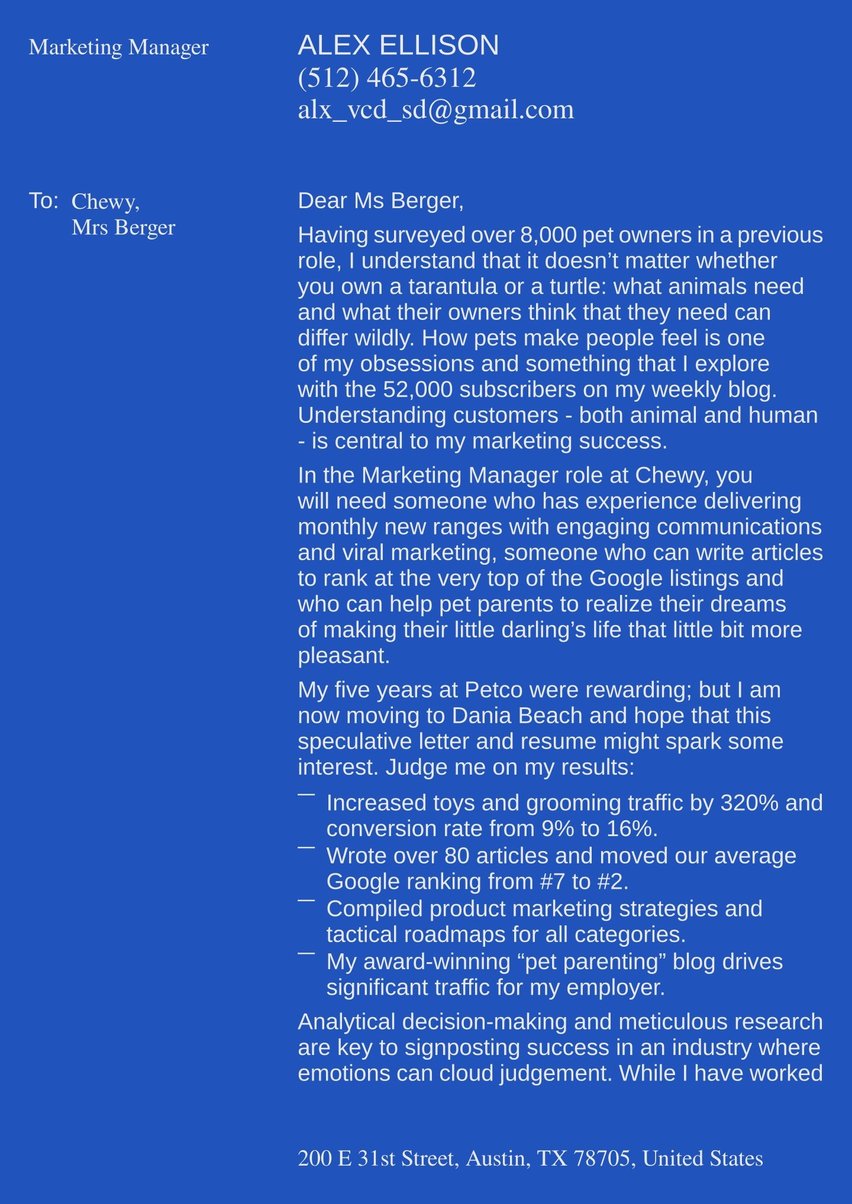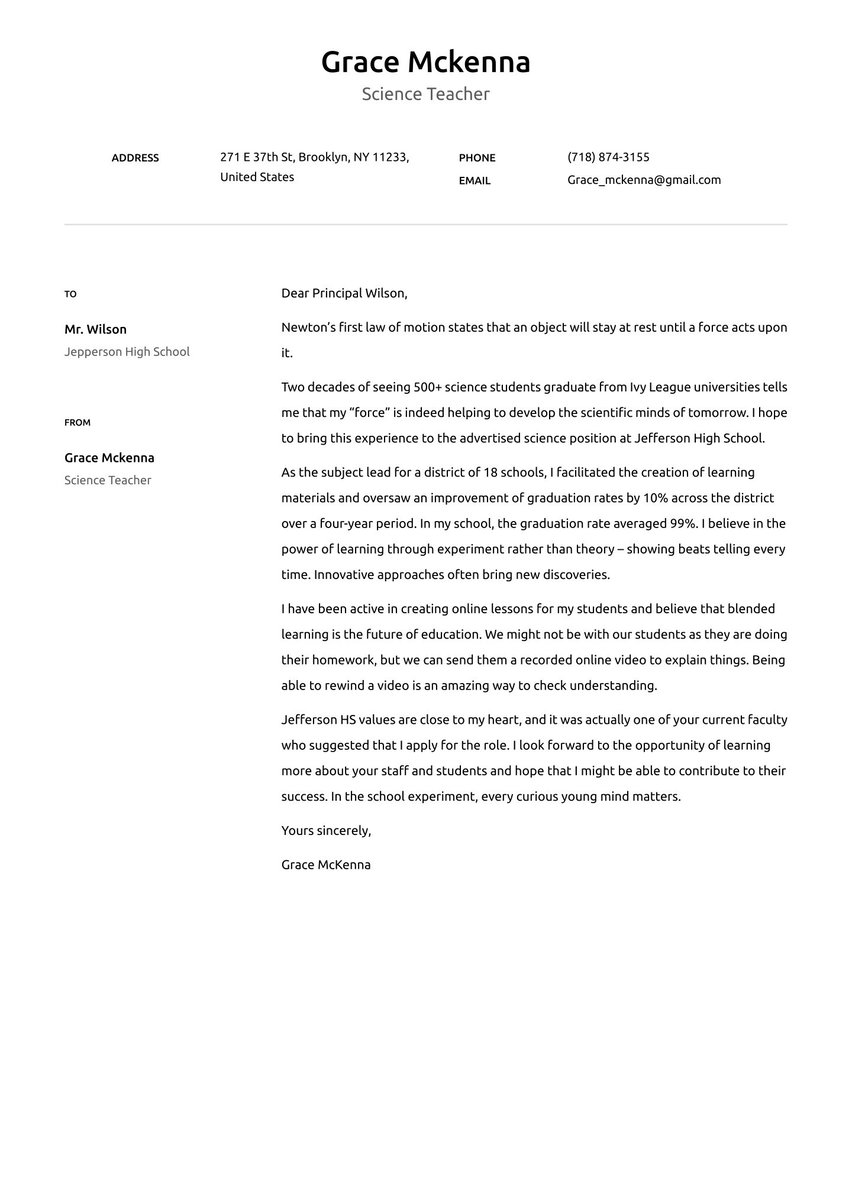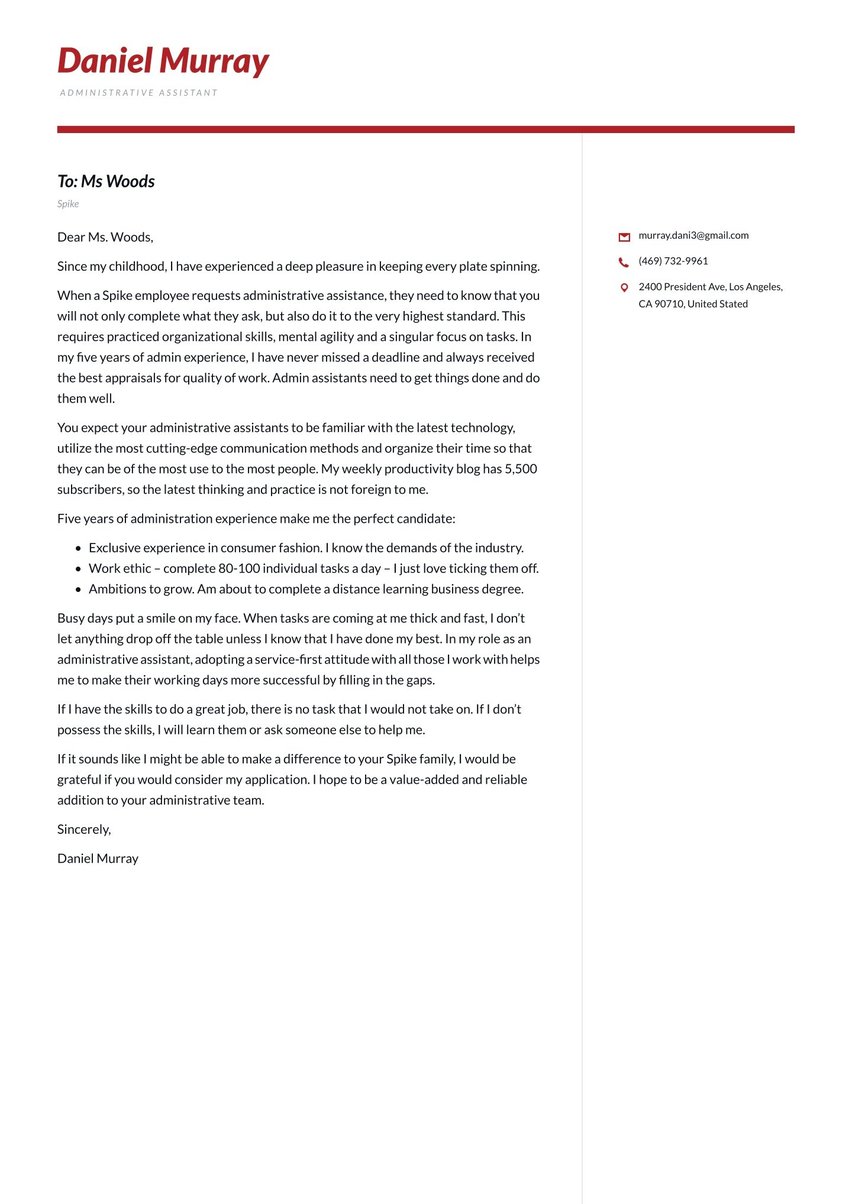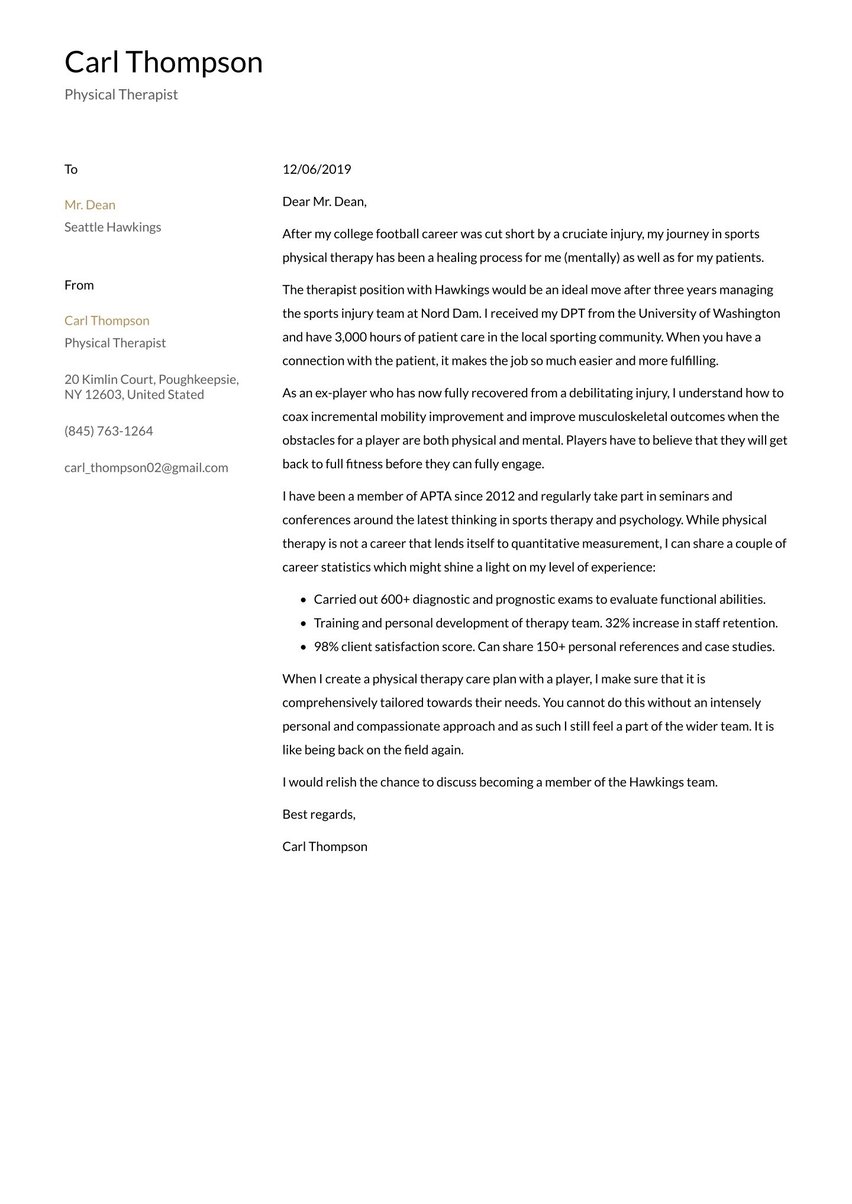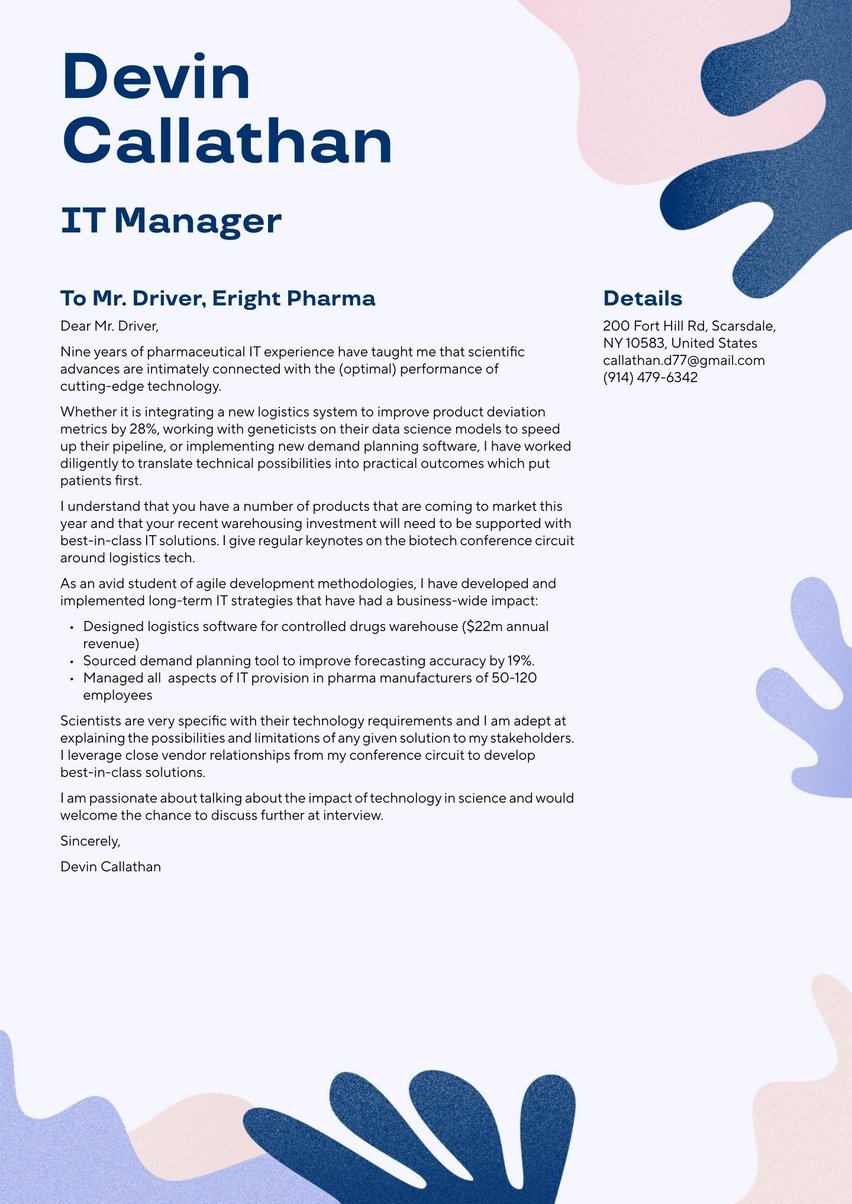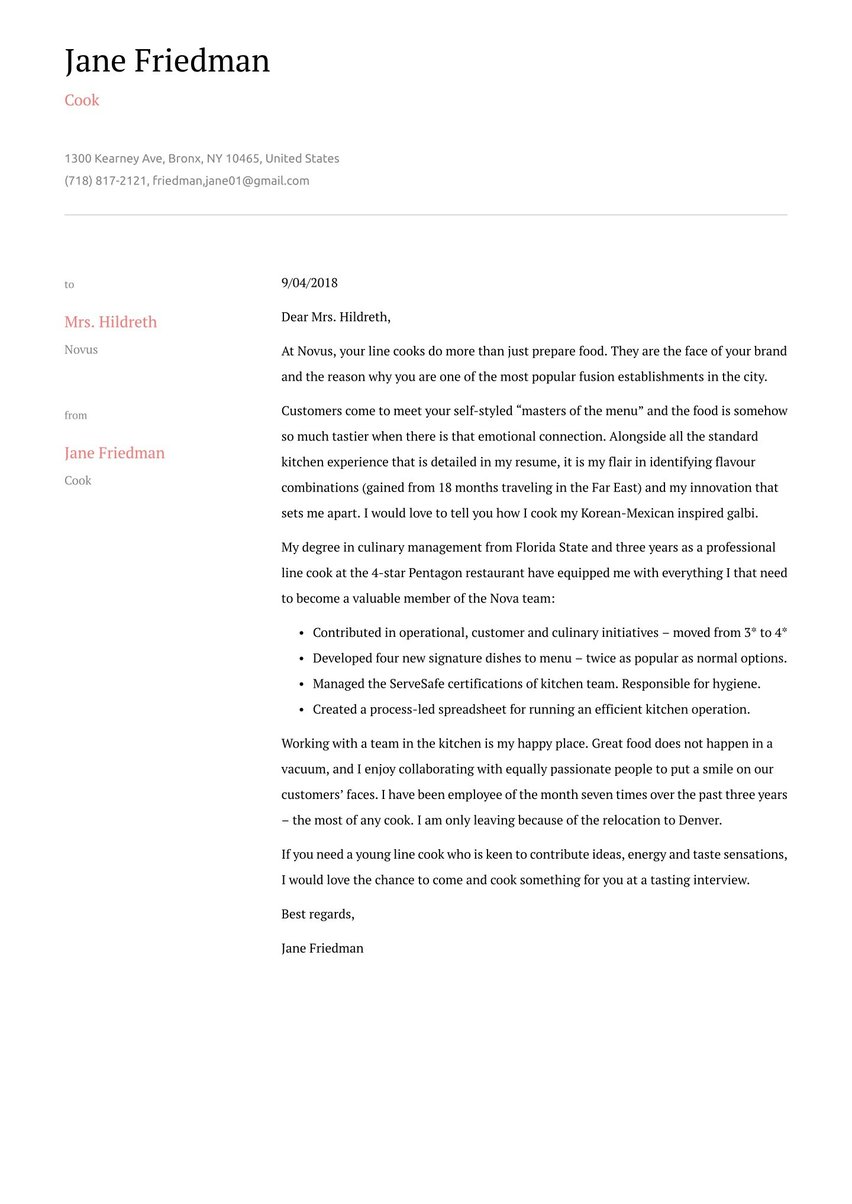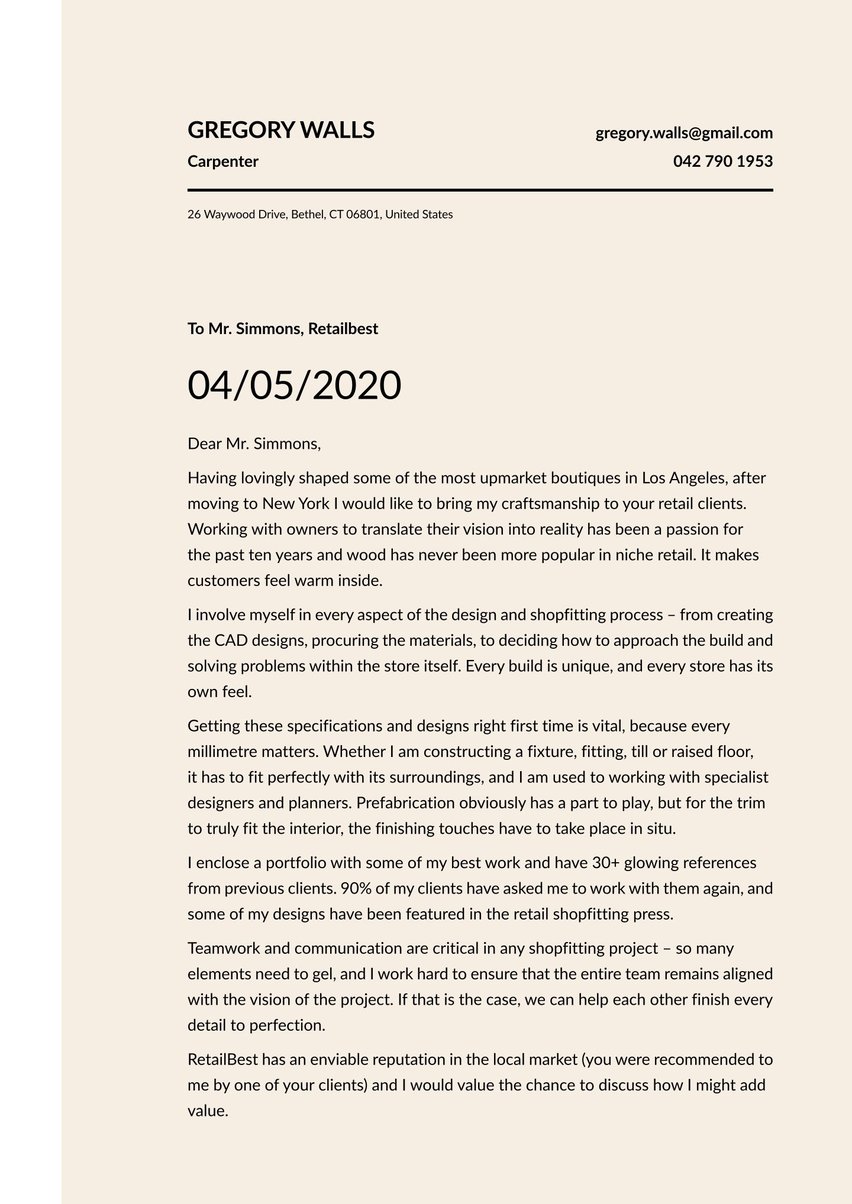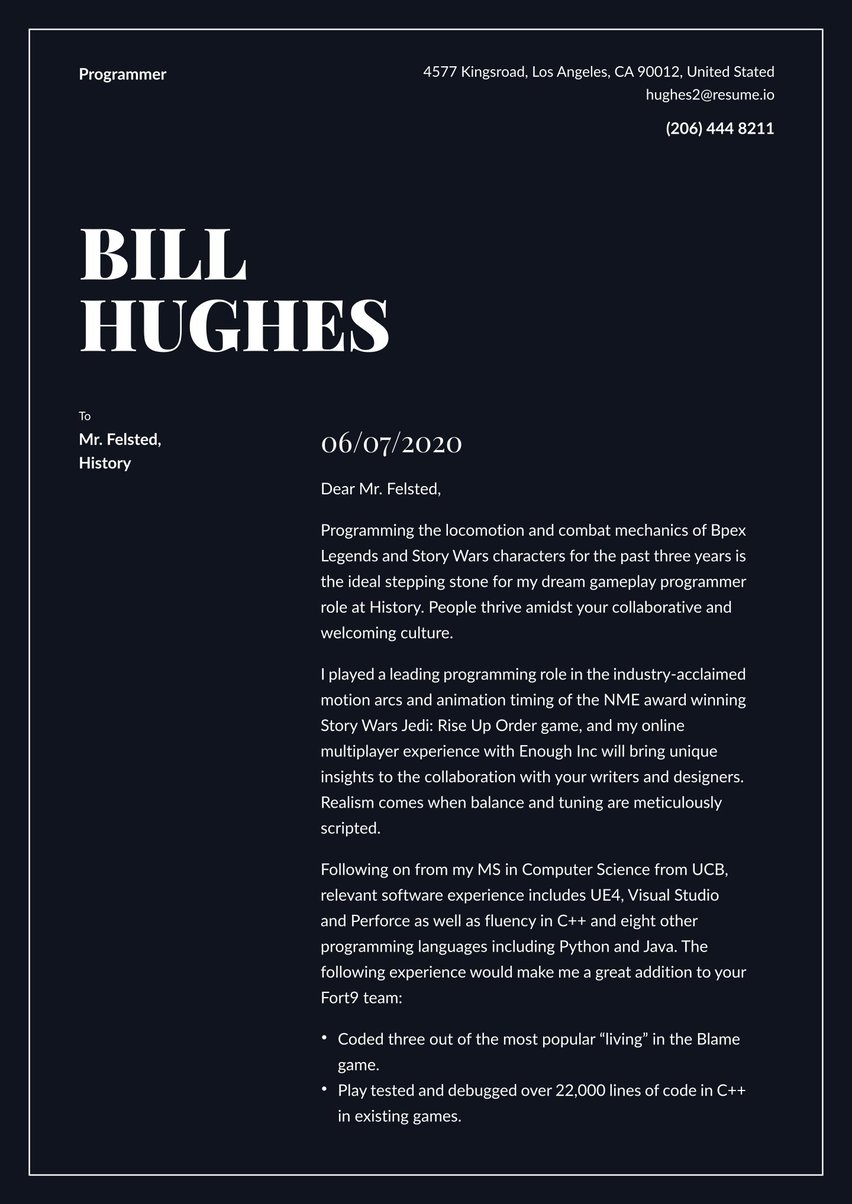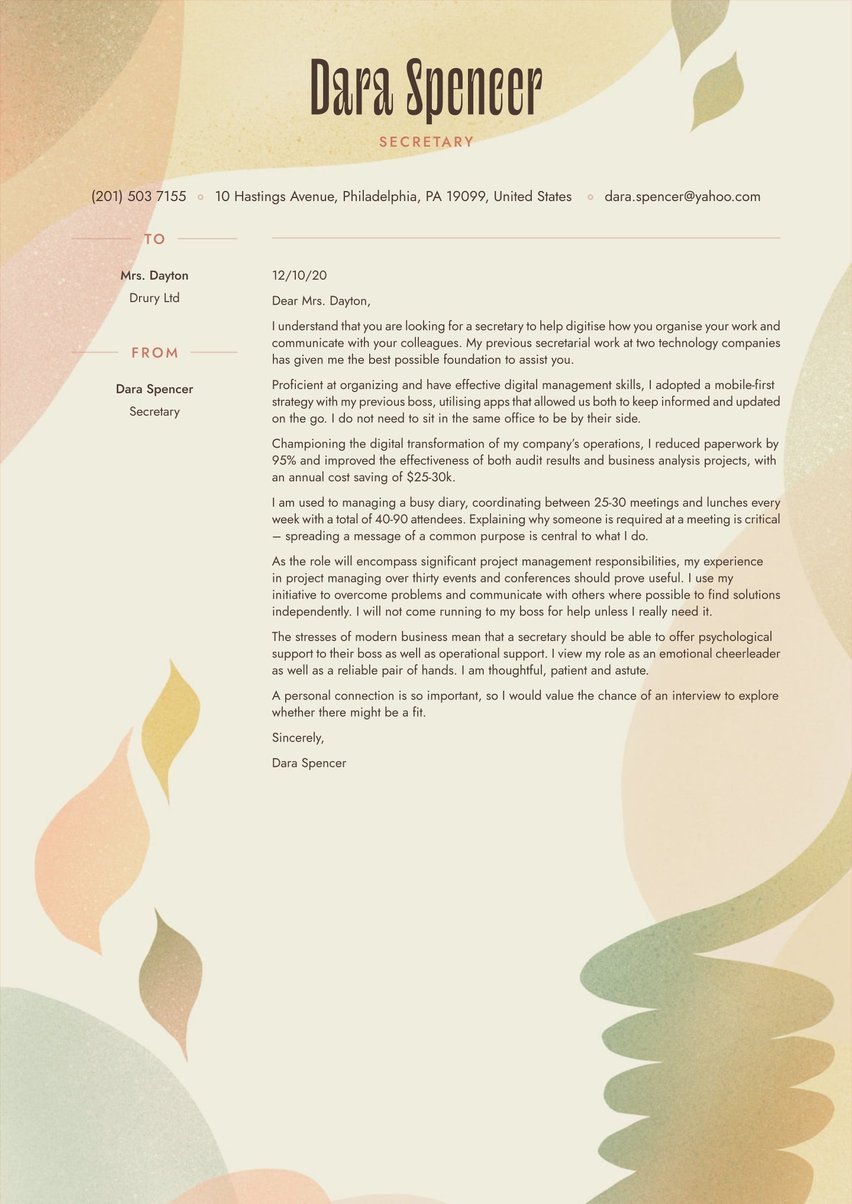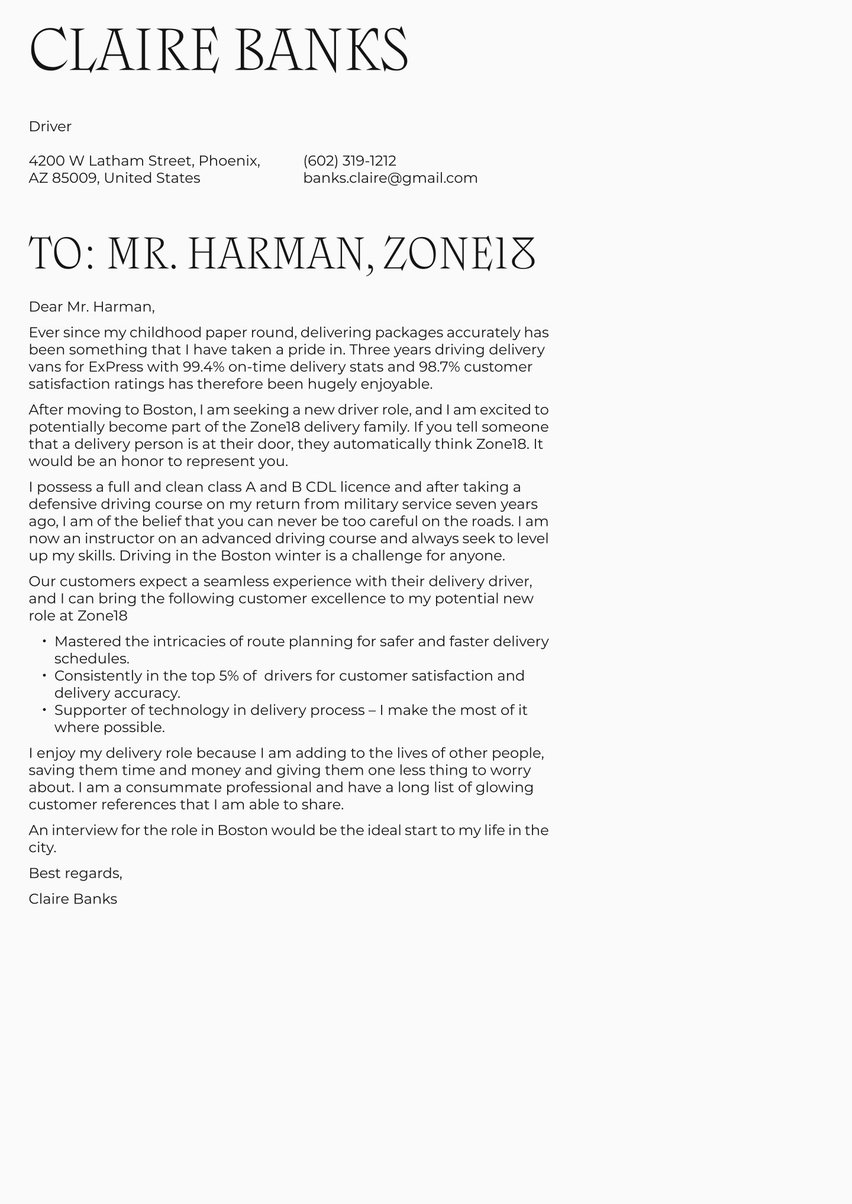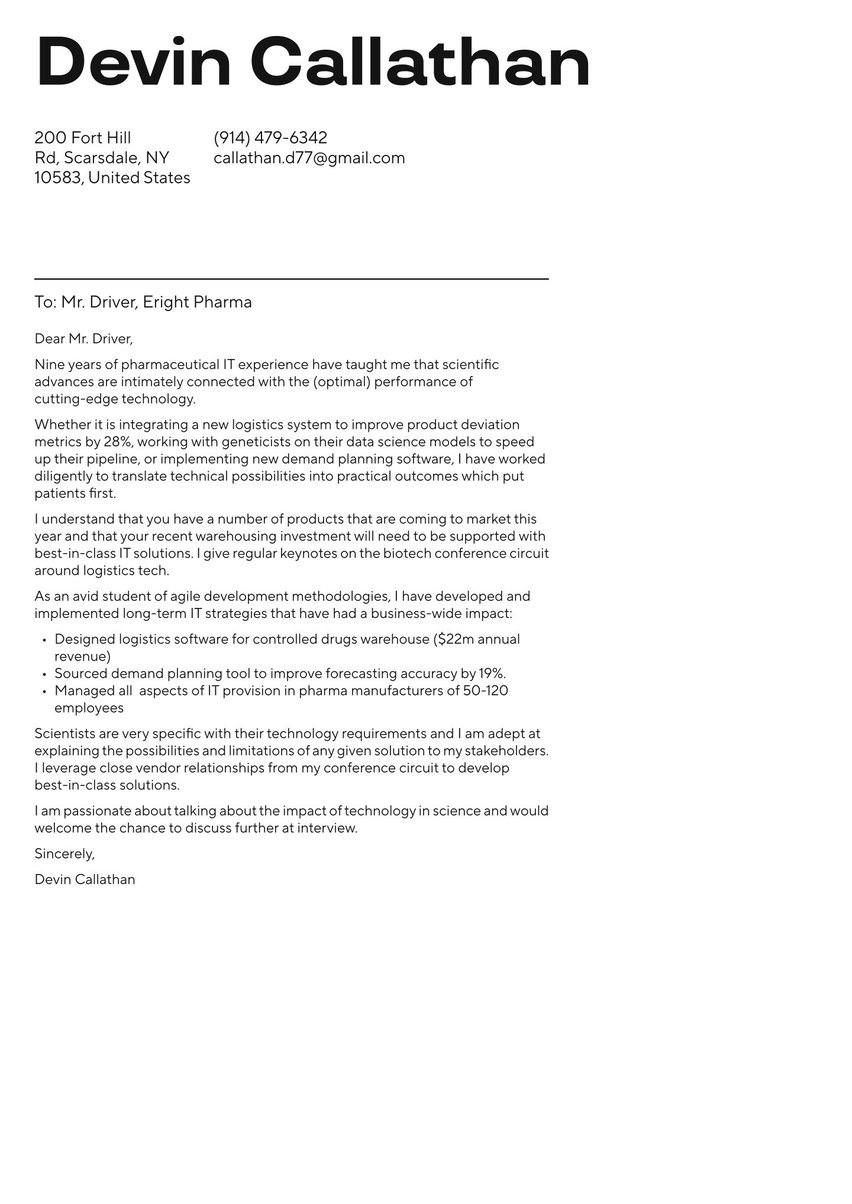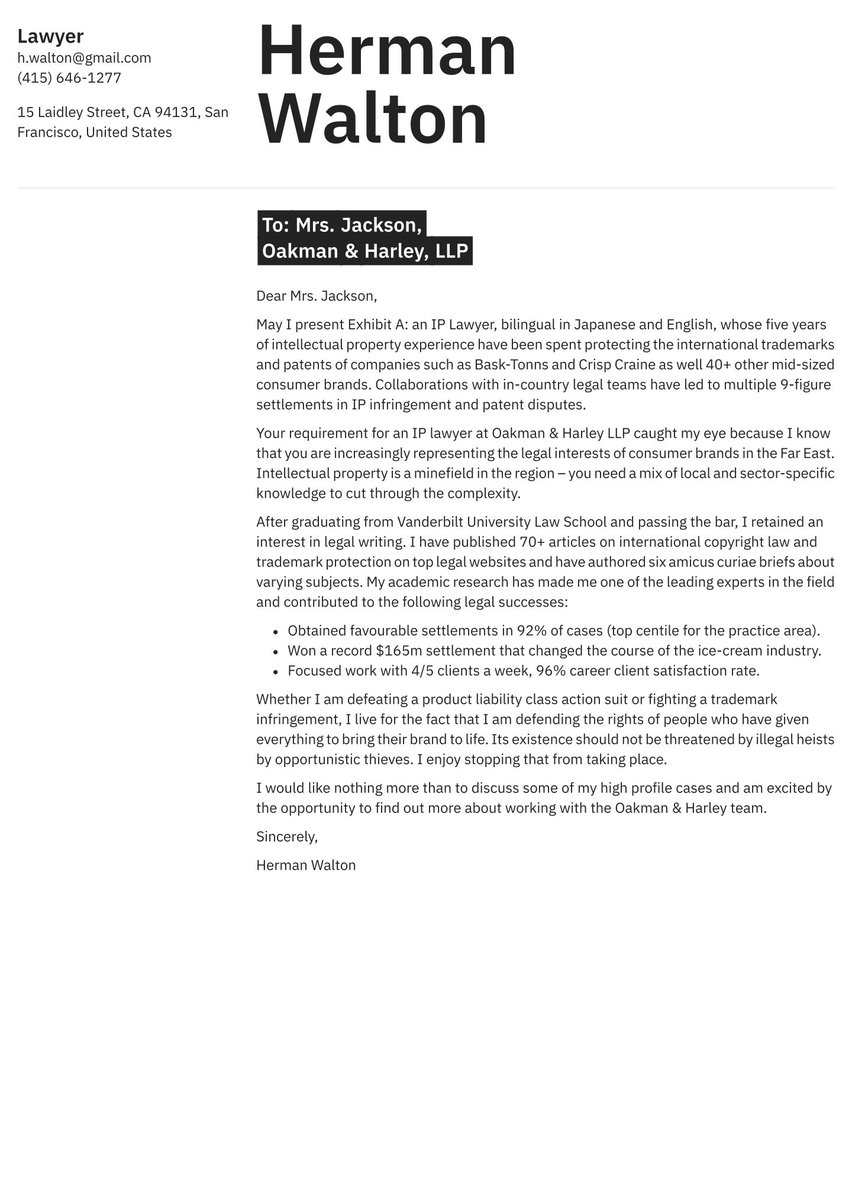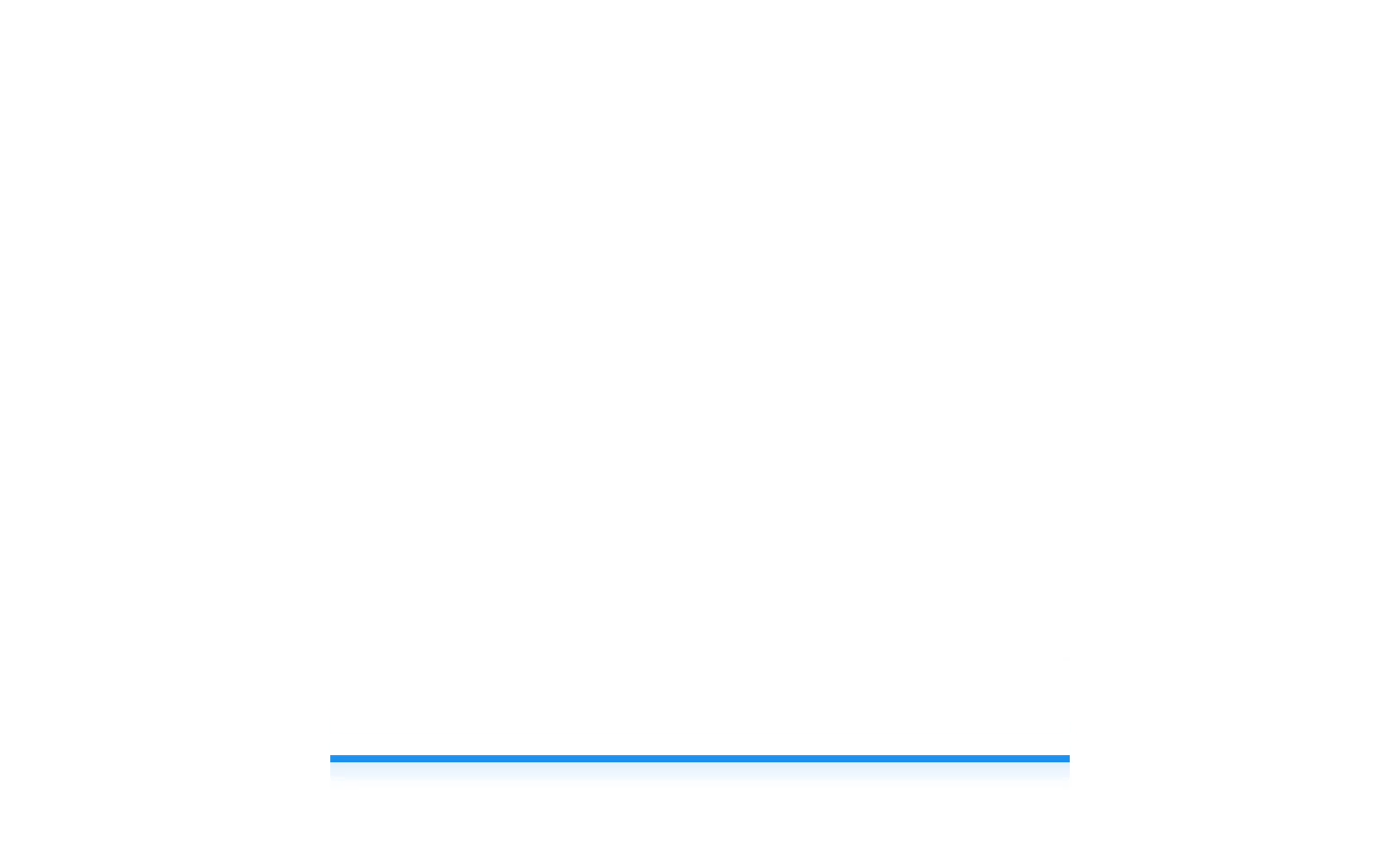Most people go to a university to study, but some go to a university to work. Whether you’re an astrophysics professor, a football coach, or a food service worker, a compelling university cover letter is a crucial part of your application for any college job.
And these jobs are not exactly scarce. One website that specializes in jobs in academia, HigherEdJobs, says that there are more than 92,000 positions at over 2,000 institutes available.
This guide, along with the corresponding cover letter example, will explore how to create the best cover letter for university applications.
University full text-only cover letter example
Dear Mr. Brawley,
During my seven years as Head of Modern Languages at Northwestern, we saw a 35% uptick in admissions and 25% improvement in overall grades. The oriental studies programme was 150% oversubscribed and 95% of all our professors published critically acclaimed research in industry-leading linguistic journals.
Moving to Austin with my family brings opportunities, and while I am happy to explore a move back into academia, the timing of the Head of Modern Languages role at the University of Texas seems perfect. I know that you are looking to grow your oriental and middle east studies departments and I trust that my experience may prove beneficial.
Students are attracted to a degree course primarily because of the diversity of curriculum and the range of options for further study. Language professors with experience of teaching courses around the cultural and historical aspects of their respective countries proved the most popular at Northwestern and it is exactly this combination that will likely help to propel the success at Texas.
Interest in studying obscure linguistics and ancient poetry has dwindled as these regions become global economic powerhouses. Students want to study things that will be relevant to their interactions with real people. That is what underpins the success of any modern languages department. I am an active participant in these academic circles and am confident that I could assist in attracting some top teaching talent to the Texas team.
I have presented at over 100+ international seminars over the past five years, raising the prestige of my university and I would hope to continue in exactly the same vein. Being proactive in exploring the issues of the day and using social media to amplify the messages is the greatest student recruiting tool that any university department can use.
I would welcome the opportunity to share my thoughts on how I might help the Texas Modern Languages department to thrive.
Sincerely,
Sandra Hangleton
Sections of a university cover letter
The format of a university cover letter is defined by its key sections, its structure, and its text volume. In most cases, a university cover letter should be one page only, with a maximum of 300 words. Unlike a 100,000-word doctoral dissertation, a cover letter prizes brevity and economy of words.
But those words need to be chosen carefully, and they need to follow a recognized structure.These are the six key elements in the format of a university cover letter:
- Cover letter header. This is where you’ll list your contact details and the date to set up your letter.
- Greeting. Make a personal connection by addressing your letter to the hiring manager or recruiter’s name if possible.
- Introduction. Kick off your letter by introducing yourself and your interest in the role.
- Body. This is where you’ll spend the majority of your word budget. Share your relevant experience, top skills, and biggest achievements. Show the reader how your background aligns with the role they’re looking to fill.
- Conclusion. Close your letter by crafting a summary of your qualifications and reiterating your interest and excitement for the role. Use a compelling call to action.
- Signature. Sign off with a professional goodbye, and, of course, your name.
While they’re all different, each section of your cover letter is an important part of your overall professional narrative.
Need more inspiration? View our other related cover letter examples from the education sector:
- Nanny cover letter
- Graduate cover letter
- Tutor cover letter
- Teacher cover letter
- Internship cover letter
- Scholarship cover letter
- Librarian cover letter
- Library Assistant cover letter
- Elementary Teacher cover letter
- Substitute Teacher cover letter
- Student cover letter
- Teaching Assistant cover letter
- Apprenticeship cover letter
Our article on how to write a cover letter offers more general cover letter information.
After you set up your header and address your letter, it’s time to captivate the reader with your introduction.
Introduction of a university cover letter
To catch a fish, you have to throw out some enticing bait. So, when you kick off your cover letter, the opening paragraph should identify the job you’re seeking and make a convincing case that you’re the right person to fill it.
For a university application, mentioning your top-notch alma mater may be one way to bait the hook. If you have years of experience in your field, that may be another. Lead with your strengths, and write a paragraph that makes it impossible for the recruiter to stop reading.
Dear Mr. Brawley,
During my seven years as Head of Modern Languages at Northwestern, we saw a 35% uptick in admissions and 25% improvement in overall grades. The Asian Studies program was 150% oversubscribed and 95% of all our professors published critically acclaimed research in industry-leading linguistic journals.
Hello, my name is Sandra and I am interested in the opening at your university. I have over three years of experience.
Make this space count by choosing a vivid example of a past accomplishment that illustrates your talents in action. For instance, if you led an initiative that increased university admissions by 35%, mention that right off the bat. Using this type of specific, quantifiable metric adds credibility to your experience.
Dear Mr. Brawley,
During my seven years as Head of Modern Languages at Northwestern, we saw a 35% uptick in admissions and 25% improvement in overall grades. The oriental studies programme was 150% oversubscribed and 95% of all our professors published critically acclaimed research in industry-leading linguistic journals.
University cover letter body
Follow a clear template in the body of your cover letter:
- Highlight your talents, experience, and skills
- Show how you're a perfect fit for the culture of the university. This is important regardless of what role you’re seeking.
- Close out with a conclusion that packs a punch
- Finish with a call to action that makes the hiring manager excited to contact you
First body paragraph: your suitability for the role (skills & experience)
The body of your cover letter—i.e., the middle paragraphs—should contain the heart of your pitch. If your introduction has hooked the fish, the body is where you reel it in. Tailor your cover letter to the university’s culture and mission, so do your research.
Given a one-page limit, list your top qualifications for the job you want. Again, this will usually include experience in your field, and in a university cover letter, it will generally address your education.
Be specific about your work experience, using figures wherever possible, and relate at least one anecdote about how you solved a problem in a previous job. Consider the following as you structure your narrative:
- Highlight your education. Universities value education, so showcase your educational background.
- Emphasize your communication skills. Working at a university requires strong communication, both verbal and written, so display that.
- Showcase public service & customer experience skills. Bring to life your experiences working with diverse communities. Many university roles include working with others, whether or not you’re teaching a class.
- Reference your research skills. Even if you aren’t applying for a researcher role, many universities prioritize the ability to hunt down and analyze information.
- Display your ability to teach others. Not all university jobs require teaching, but the ability to train and coach others is a positive in any role.
- Show off your role-specific expertise. Whichever role you’re targeting likely has its own requirements, so clarify how your background aligns with them.
Especially if you’re applying to a public institution, you’re likely to uncover the name of the hiring manager on the university’s website. The website may even display a bio that shares more about the person’s background, giving you anecdotes to reference in your cover letter.
If you reach a dead end on the university’s website, try searching on LinkedIn and using the hiring manager’s LinkedIn profile to learn more about them.
Second body paragraph(s): alignment with the organization
Reference the name of the university where you’re applying and explain what it is that makes you want to work there. Let the employer know that you aren’t just mass-mailing job applications to random universities, but that you specifically want to work for this one. Start by understanding their mission statement.
For example, the University of Texas’s mission statement includes:
- Advancing society via research, knowledge, and creativity
- Providing superior educational opportunities
- Serving students and providing beneficial public services
- Transforming lives to benefit society
Incorporate the specifics from the university’s mission into the body of your cover letter and show how your own values and experiences align.
Moving to Austin with my family brings opportunities, and while I am happy to explore a move back into academia, the timing of the Head of Modern Languages role at the University of Texas seems perfect. I know that you are looking to grow your oriental and middle east studies departments and I trust that my experience may prove beneficial.
Students are attracted to a degree course primarily because of the diversity of curriculum and the range of options for further study. Language professors with experience of teaching courses around the cultural and historical aspects of their respective countries proved the most popular at Northwestern and it is exactly this combination that will likely help to propel the success at Texas.
Interest in studying obscure linguistics and ancient poetry has dwindled as these regions become global economic powerhouses. Students want to study things that will be relevant to their interactions with real people. That is what underpins the success of any modern languages department. I am an active participant in these academic circles and am confident that I could assist in attracting some top teaching talent to the Texas team.
I have presented at over 100+ international seminars over the past five years, raising the prestige of my university and I would hope to continue in exactly the same vein. Being proactive in exploring the issues of the day and using social media to amplify the messages is the greatest student recruiting tool that any university department can use.
Call to action & conclusion: Finish off strong
Close out your cover letter with a reiteration of your key points and your excitement about the position.
Add an enticing call to action for the hiring manager to reach out and discuss how your background and interests are in line with the university’s goals.
Express your gratitude to the reader for considering your application and taking the time to read it. This shows you have good manners, of course, but also reaffirms your interest in the position.
Finally, finish off this section with a clear invitation for further engagement in the hiring process.
I would welcome the opportunity to share my thoughts on how I might help the Texas Modern Languages department to thrive.
Sincerely,
Sandra Hangleton
Sign off with your name. More than just a formality, this is your final touch and last chance to leave a memorable impression.
Cover letter mistakes to avoid
Here are some mistakes you want to avoid in your university cover letter:
- Typos, misspellings, and bad grammar. Remember, you’re writing to a university. In a one-page letter, you can’t afford even one writing mistake.
- Copy-paste letters. Sending the exact same cover letter to multiple employers is a recipe for failure. Customize each cover letter for each employer and speak to its specific needs.
- Wasted words. Irrelevant info, clichés, and fluff will fill your page with useless language. Devote the precious space you have to using original language that addresses what makes you a great candidate for this job.
- Design fails. A poorly designed header, a font too small to read, or any other design and formatting errors can lead to rejection the moment the recruiter opens your letter.
How to write a university cover letter with no experience
If you hope to earn a university job but don’t yet have experience, whether that’s due to transitioning from another field or being a student with limited work history, you can still set yourself up for success.
Focus on transferable skills and consider the following:
- Highlight transferable skills. Show how skills and experience from past roles are relevant to this one. For example, skills like customer service as well as strong communication and interpersonal skills are useful in any position.
- Showcase organizational abilities. It’s exceptionally useful to be able to organize projects, systems, people, or spaces, so display these skills if you have them.
- Emphasize technological proficiency. Some universities are very focused on innovation and technology, so use this space to showcase any technical skills you have. Even if they’re self-taught, that shows your commitment to continuous learning.
- Mention any research experience. Have you done deep dives into topics in order to understand them or convey information to others? Have you led research projects or published papers in school?
- Include academic experience. Mention your education, especially from this or other universities. If your education is specifically relevant to the job to which you’re applying, list some of the most relevant courses you took.
- Express your passion for innovation and knowledge. Universities are known for innovating and fostering a culture of knowledge, so share if this resonates with you.
These points will help balance out the lack of direct experience in your cover letter and illustrate your potential, giving you the best chance to land the job.
Consider ATS
An applicant tracking system (ATS) is a tool many companies use to collect and track job applications. Some advanced systems utilize algorithms to scan and rank resumes based on how well they meet the requirements of the job. While your cover letter may not be the focus of the system, it helps to ensure you’re using the right language.
Review the job posting and notice frequently used words or those that seem significant. If they’re relevant to you, incorporate them into your cover letter.
The ATS algorithm sorts through candidates’ applications by scanning for specific keywords.
Example:
- “Research experience”
- “Master’s degree”
- “Teaching and training”
Key takeaways
A well-organized cover letter for university applications can be a powerful tool. Use this letter as a way to highlight your relevant skills and experience.
Following the tried-and-tested cover letter format detailed here, you’ll showcase your unique strength. If you’re lacking direct experience, show off your transferable skills and eagerness to learn.
Using our cover letter builder is a simple way to assemble a polished, professional university cover letter, helping you land the job of your dreams.


